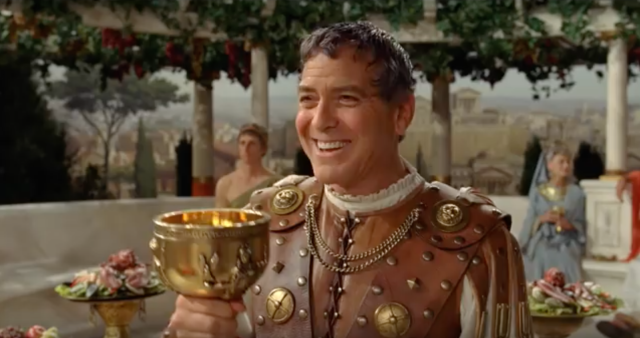
Like a lot of Classicists I know, I have eagerly been anticipating the latest film from the Coen brothers, Hail, Caesar! I expect, however, that I might be slightly unusual in that besides a vague professional interest in how the ancient world is depicted on screen, I also have a deep and abiding love for Hollywood films of the forties and fifties, which are exactly the setting for this movie. (I did, after all, spend a recent Sunday afternoon in the cinema watching Cover Girl, which stars my favourite song and dance man Gene Kelly alongside Rita Hayworth. Gene Kelly is the model for the character played by Channing Tatum, who first appears on screen as the lead in an ensemble cast of Navy men, bemoaning their forthcoming time at sea and lack of women: ‘We’ll see a lot of fish but we’ll never see a dish!’ This throwback to Kelly is no where more evident than when they are dancing on tables whilst the disgruntled barkeep pulls the tablecloths from under their feet.) There are colleagues more expert than I who have already begun writing about classical themes in the film, and there is little that I would want to add, except that I particularly enjoyed seeing replicas of the Augustus Prima Porta flanking the temple on the stage set for the film within a film that provided the title. Instead, as I sat in the dark cinema scribbling illegible notes to myself, it wasn’t the representation of Rome that piqued my interest, but something else all together.
The film within a film, Hail Caesar: A Story of the Christ, in which George Clooney’s character of Baird Whitlock stars, is a send-up of the typical big budget sword and sandal epics of the mid-twentieth century. It is Ben-Hur and Quo Vadis and The Ten Commandments all rolled into one. But most importantly, it is Spartacus – not the film itself, but the circumstances in which the film was made. Made in 1960, Stanley Kubrick‘s film and its star Kirk Douglas, went some way to end the blacklisting that had run rampant in Hollywood throughout the late 1940s and the 1950s. Howard Fast, who wrote the novel on which the film was based, was blacklisted and as a result, originally had to self-publish his book. He was called before the House Un-American Activities Committee (HUAC) in 1950, but refused to name any fellow members of the Communist Party. The screenwriter for the film was a man named Dalton Trumbo, who had been blacklisted in 1947 as part of the Hollywood Ten, a group who were accused by HUAC of not only subverting democracy by inserting Communist propaganda into their films, but also for refusing to cooperate with the Congressional hearings. Douglas is credited with insisting that Trumbo not use a pseudonym in the credits, and thus ended the blacklisting. Rather famously, JFK crossed picket lines in order to see the film, demonstrating that the activities of McCarthyism were well and truly at an end.
So… what does this have to do with the latest effort of the Coen brothers? Herein lies the only spoiler: there are Communists in the film. Screenwriters, producers, and others gather to bemoan their role in producing for the studio, which they claim is an instrument of capitalism. That they are speaking of a company called Capital Studios is surely no coincidence. As part of their discussion over finger sandwiches and tea in a Malibu mansion, they cheer themselves for inserting Communist ideas into films, exactly as the Hollywood Ten were accused of doing. When Clooney’s character is kidnapped and converted to the political and economic agenda of the Communists, he threatens, upon learning he won’t get a share of the ransom paid to return him, to ‘name names.’ The elements that surround this plotline, which is indeed only one of many in the film overall, are clearly more about the history of blacklisting in Hollywood than it is about Rome itself. Others have commented on the economic aspects of this film, but I think have failed to recognise the significance of the statement this makes about politics, the arts, and fear. Douglas said, in reference to his work on Spartacus, ‘I was making a film about freedom at a time when freedom in America was in jeopardy.’ Well, quite. In the current political climate in the U.S., with many recent comparisons between a declining American way of life and the end of the Roman Empire, it seems the Coens have inserted a pertinent warning wrapped up in farce of just how bad things can get when party politics, fear-mongering rhetoric, and demagoguery rule the day.
I think maybe I’ll go watch Gene Kelly dance his way across Paris and into Leslie Caron’s heart. That’s a much nicer story.
